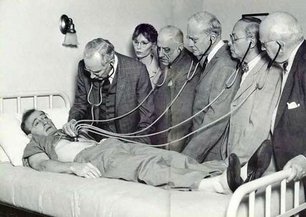 We frequently have medical students attached to our service. They spend two weeks trying to develop skills in clinical examination of the heart. On rounds we talk about the x and y descents of the jugular venous pulse, reverse splitting of the second heart sounds and the sound of a tumour plop in a patient with an left atrial myxoma. Time is spent trying to identify murmurs, assess their haemodynamic significance and find the physical signs of cardiac disease. But clinical cardiac examination comes from a bygone era originated before the advent of modern imaging techniques. Would the doyenne of British cardiology, Dr Paul Wood, have spent so much time perfecting the art of cardiac examination with the stethoscope if he had been able to get an echocardiogram instead. It might be a neat party trick to diagnose first degree heart block from the intensity of the first heart sound but now we make this diagnosis accurately and reliably from the ECG. What is the value of the stethoscope in modern cardiac assessment and are we entering an era when cardiac examination is simply not relevant to good patient care? Universal availability of echocardiography and the ability of most younger cardiologists to perform bedside screening echo with a handheld machines leads me to wonder what the stethoscope adds to the assessment of the heart in 2014. A recent paper in the American Journal of Cardiology looked at some of these questions by interviewing doctors and cardiac patients about their attitudes to cardiac examination. 123 patients were interviewed and 74% of them expected to undress from the waist up when they visited a cardiologist and 50% expected to undress every time and be examined. Importantly 98% patients felt better after they had been examined. They surveyed 135 health care professionals. Nearly half of practitioners rarely or never undressed the patient to examine the heart and 80% rarely or never examined them in the left lateral decubitus position. Most cardiologists however routinely palpated the apex, carotid artery, radial artery, and the peripheral pulses and listed to the heart. Why do we examine the heart? Patients expect it and importantly feel better after it but if the valve of the cardiac examination is to diagnose illness can it be replaced by technology such as echocardiography and ECG. Physical examination might be more cost effective than echocardiography but most cardiologists will request this tests anyway and we shouldn't forget that the cost of medical care is also the cost of error, or uncertainty which are both greater if you rely on physical examination alone. Perhaps the physical examination is essential as part of the enhancing the doctor-patient relationship. Sometimes patients complain that they weren't assessed thoroughly "The doctor didn't even bother to examine me". Experienced bedside evaluation allows efficient gathering of diagnostic information there and then at the clinic visit and its ritualistic features deepen engagement with the patient. The waning of bedside skills may also lead to delay and error in diagnosis and subject patients to unnecessary testing. Is physical examination accurate? Cardiologists examining 100 consecutive patients with systolic murmurs concluded that the physical exam could differentiate a functional murmur from an organic murmur. If the examination included inspection, palpation and auscultation in the context of symptoms and history most structural cardiac abnormalities were accurately detected or in the differential diagnosis. When a murmur was determined to be benign usually the echocardiographic results were normal. My impression is that doctors have less confidence in the accuracy of the bedside cardiac examination and as it takes less than 30 seconds to order an echocardiogram it is obvious why the cardiac exam is abbreviated, demeaned and discredited however I suspect it will continue to be used as patients expect it and feel better for it.
0 Comments
|
Dr Richard BogleThe opinions expressed in this blog are strictly those of the author and should not be construed as the opinion or policy of my employers nor recommendations for your care or anyone else's. Always seek professional guidance instead. Archives
August 2023
Categories
All
|
 RSS Feed
RSS Feed

